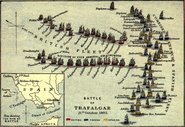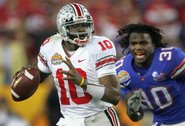It’s hard for any American to associate Thanksgiving with anything other than turkey, stuffing, cranberry sauce, family and football. We enjoy a rare Thursday holiday in the beginning of our cold season with few of the holistic responsibilities of other holidays; there are no presents to buy, no veterans to thank, no fallen heroes to remember, and no church to attend. Instead, most of us sit back to enjoy the company of family and friends, huge portions of food and the accompaniment of football, be it high school, college or professional. Of course some traditions are critical. There is always the reunion drinking that precedes Thanksgiving, a time where old friends congregate in the same places to get obnoxiously stammered and ask the obligatory question to old friends and acquaintances they have not seen since the previous year, “What have you been up to?”
After eating your fill at the Thanksgiving table, there are the driving while drowsy jokes that are required to follow any discussion on how much turkey was consumed. While glancing at the advertisements for Black Friday sales, someone always must be “amazed” at those nut-jobs that line up for the mad dash. There is even a scheduled Thanksgiving weekend football match against the rival squad that never seems to materialize into anything of the magnitude that was supposed on the prior Wednesday night. Thanksgiving may be the best of all American holidays, but even when the name is stuck right in the middle of the holiday’s title, there is still some forgetfulness for what the holiday stands for: Giving Thanks.
In a society where food is eaten without even the slightest regard to how it was raised or grown, we are either forgetful or ignorant of the struggles of early Americans to forge their way in a new world filled with novel beasts and grasses, without the familiarity of domesticated fowl or livestock and English crops. Pilgrims to America had difficulty adapting to the new foods and it took Tisquanto (who was kidnapped, sold into slavery, lived in England, spoke fluent English) and Massasoit, the Great Sachem of the Wampanoag tribe to help Plimouth Plantation to survive those early cold winters. After all, a people who looked upon the bounty of New England seafood as vile and disgusting would need help surviving their meager harvests. A March 1621 peace agreement between John Carver and Massasoit, sealed with smoke from a peace pipe, allied the Wampanoag and Pilgrims (and later the Massachusetts Bay Colony) for more than forty years.
Thanksgiving symbolized the culmination of the harvest, a concept that is completely foreign to the American removed 300+ years. Looking through a local supermarket, there are apples from New England mixed in with Spanish clementines, Florida oranges, lettuce from South America, Peppers from California. Most food that we eat in winter is foreign. There is no more annual harvest, a time that would accentuate the differences among each regional culture. There are of course the vestiges of this and lucky for us, because early American tradition roots in New England, there is a strong market for pumpkins, squash, cranberry sauce and turkey, all native to New England. At least, New Englanders observe Thanksgiving as they would their native harvest. The harvest was a time for abundance, with a strong basis in God’s blessing and the Thanksgiving feast was a celebration of God’s bounty. In other cultures, Harvest was very much spiritual event as it was a physical event.
While we have lost much of the significance of Thanksgiving in modern society, it is more than ever appropriate to think about all the things we should be thankful and grateful for, especially in an age where there is so much bounty and comparatively little suffering amongst us. Happy Thanksgiving.
11 years ago








No comments:
Post a Comment